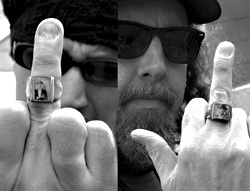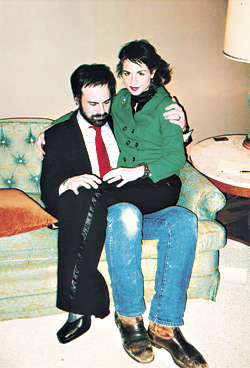When Sun City Girls member Charles Gocher Jr. died in February 2007 at age 54 after a three-year battle with a rare form of cancer, the planet didn’t just lose one of its most enigmatically talented drummers. It was also minus one wildly creative character: a multi-instrumentalist and gifted songwriter, a twisted video auteur, a prolific writer and beat poet who was a never-ending font of insight and absurdities. His fellow Sun City Girls, Alan and Rick Bishop, lost a madcap muse they considered their “other brother.” And I lost a friend who was one of the more formatively influential individuals in my life.
While the Sun City Girls had been Seattle-based since around 1991, the trio—taking its name from an Arizona retirement community—called the Phoenix area its home for the bulk of the ’80s. I lived there during that time, and I had many great conversations with Charlie Gocher, be it at a show, a party, on the street, or in a record store. When I worked at Zia Records in Tempe, Ariz., in the mid-’80s, Charlie would come in just gushing with wacky ideas. Once he came into the store ranting about “clear hair.” At the time, all the punk girls were dyeing their hair every color of the rainbow, and Charlie thought clear hair was the next logical step. And sure enough, the clear-hair concept popped up in 1987 on the title track of the band’s third album, Horse Cock Phepner. Charlie’s wild musings would often end up in Sun City Girls material.
Charlie was the first person who really opened me up to more avant-garde stuff like free jazz, and I wasn’t the only one influenced by his encyclopedic erudition. “He was the first serious, true jazz musician that I spent any time with,” remembers Sun City Girls bassist Alan Bishop in a phone call from his North Seattle home. “He was very knowledgeable about everything to do with American jazz music. I already liked jazz, but he was much more into fringe jazz and free jazz. And he played it.”
Gocher was an integral component of the Sun City Girls for more than 25 years, from the time he showed up at a pizza-joint open-mike night Alan was hosting in 1981 until his death on February 19, 2007. During that time, the prolific trio released an insane number of albums, cassettes, 7-inches, videos, side projects, and the like, all of which are equally amazing in their own right. Some of it could be considered “difficult” listening, but SCG were always more interested in challenging people than pleasing them (though they did write a goodly number of amazingly beautiful songs).
The band’s daunting discography spans everything imaginable (and unimaginable), from gorgeous pan-cultural love songs to ribald absurdist rants, along with hours of the legendary improvisation that helped earn SCG a reputation as one of the nation’s finest and most influential underground bands. Alan and Rick are often pegged as bassist and guitarist; however, they’ve both played seemingly every instrument conceivable. Gocher’s contributions were well represented on most of the band’s recordings, though his genius truly shines on 1997’s double-disc Dante’s Disneyland Inferno. That release is rife with hilariously brilliant, rapid-fire Charlie rants, as well as a heartrending track entitled “Charles Gocher Sr.” In essence, it’s Charlie eulogizing himself after he dies, through the voice of his long-dead father. The lyrics are so apropos to Charlie’s passing that they were printed in their entirety on the cover of a booklet that was handed out at a private memorial at the band’s compound in Ballard shortly after he died.
Gocher’s only solo album, Pint-Sized Spartacus, was also released in 1997. It has been described as “a concept album loosely based on the film Spartacus but with the added twists of mental problems, Lucky Luciano, and the white slave trade in India.” After listening to this brain-blaster straight through, this seems as accurate a representation as any. If you want fucked-up narrative and an unadulterated peek into the mind of Gocher, this is the disc for you. As far as SCG-related releases go, it’s not too hard to find in the used bins.
Live, Sun City Girls were notorious for often adding an unhinged dramatic element, due in no small part to Gocher’s antics. Even during more straightforward performances, he was a sight to behold. His flailing, maniacal approach gave new meaning to the term “free-form,” and more than one drum kit went flying in all directions as a consequence. “I read a pop bio about Harry Houdini,” Gocher said in a 1994 Seattle Weekly feature, “and it inspired me to make it seem like I was breaking out of manacles and a straitjacket. So I played the drums like that—and I still do. It’s an escapist reality, in a way!”
The Bishop brothers had worked with other drummers prior to Gocher, but he provided the linchpin for the fearless psychic improv that the Sun City Girls would become so well known for. “With Charlie, it opened everything up to us,” says Bishop. “Because rhythmically, he was eliminating the floor, and then all of a sudden we could all float. And that was the key, because when there’s no more gravity, you don’t have to be on this foundation, and you’re able to just continually challenge yourself in each experience afterwards playing jazz music, or free music, or improvising in general. And I think just knowing that he was on board gave me the courage to relax and be confident in being able to express myself.”
Gocher’s influence expanded far beyond his unique percussive skills. A voracious consumer of information, Gocher brought a question-everything mentality to the table, whether it be with his Sun City cohorts or people he would meet at a party. “He was very good at challenging authority,” says Bishop, “or just challenging the way people thought. He was always asking questions, and turning people’s questions into questions. He was articulate in the way that he could confuse and take over a discussion, flipping it around on people. He was a ringleader of sorts, and a situationalist in his own way as well.”
Gocher’s history is a bit clouded in mystery, but the Bishop brothers have been able to piece together his life story over the years. He was born in San Rafael, California, and his dad died when he was 9. His mom passed away a year before Gocher did. He played in a late-’60s pop cover band in Glendale, California; later, he moved to Prescott, Arizona, where he was a guitarist in a California-sound acid-rock band called Cha Cha Billy. After that, he relocated to Phoenix, where he eventually met the Bishop brothers when he executed a bizarre performance-art piece at that infamous open-mike night at Tony’s Pizza. Gocher was immediately asked to be the drummer for Sun City Girls, and the rest is history.
And when Charlie died, the band name went with him. “If Rick and I were ever going to decide to play in a trio again, and get a percussionist of some sort to perform with us or record with us, we’re just not using the name,” Alan explains. “We’ll call it something else, because it won’t be Sun City Girls, it just couldn’t be. For the same reason if Rick or I had died, I can’t see any of us really being replaceable. Doing songs is one thing, but performance and improvisation is another, and you just can’t pick this kind of stuff up off the street at the Union Hall, or put an ad in the back of the local weekly.”





